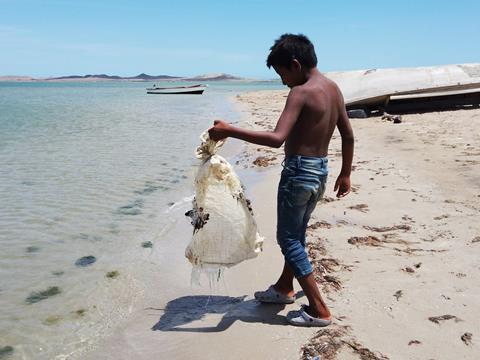
Key players from across the packaging value chain have united under the Colombia Plastics Pact, which intends to reduce plastic pollution in the Colombian environment and assist the country in achieving a circular economy for its plastics.
Over 700,500 tonnes of plastic packaging and containers are currently thought to enter the domestic market in Colombia every year, although as little as 3% of that figure is expected to be repurposed in packaging applications. Therefore, WRAP and The Business Commitment to Recycling (CEMPRE) have joined forces to launch the Colombia Plastics Pact – aiming to unite industry players across the value chain, including packaging companies, producers, traders, processors, academia, trade associations, NGOs, and the government in pursuit of a circular economy for plastics.
All ‘problematic’ and unsustainable plastics are anticipated to be phased out in favour of reusable, recyclable, or compostable alternatives, with its plastics recycling rate currently targeted at 50% and its average recycled content at 30%. The Pact’s participants will work towards a series of science-based targets in the hopes of developing a circular system for the commercial utilisation of plastics and reducing the harm that such materials cause to the environment.
Amongst the businesses currently taking part in the Pact are Nestlé, Carvajal, Coca-Cola, Plastisol, Jerónimo Martins, Grupo Plastilene, Xiclo, and Resiter. Acoplásticos, The Consumer Goods Forum, WWF, and the University of Los Andes will also provide support for the project.
“We are delighted to work with CEMPRE to launch the Colombian Plastics Pact,” said David Rogers, international director at WRAP. “Tackling plastic pollution requires a collaborative joined-up approach between businesses, policymakers and citizens and the Pact will provide the mechanism for driving real, long-term change.
“The Colombia Plastics Pact joins a growing network of Pacts around the world. This network allows us to share ideas and solutions and increase the speed of change.”
Laura Reyes, executive director of CEMPRE, added: “The circular economy is the model that recognizes the environmental and social value as fundamental axes of the sustainable development of countries and their territories. There are a number of benefits in promoting the circular economy to value chains, from improving the design of products and promoting different forms of consumption, to encouraging labour and business formality and valuing the real cost of the products we consume.
“Moreover, by adopting a circular economy for plastics we keep plastic in production chains and away from the places we need to protect, such as the oceans as well as reducing social gaps in those regions and encouraging private sector investment in new technologies. The Colombia Plastics Pact promotes the circularity of plastics and shows us that together it is possible to work towards sustainable economic development.”
“The active participation and the collaborative work between multiple stakeholders from the plastic value chain, public and private sector, and academia allowed us to develop the elements needed to build the Colombia Plastic Pact,” concluded Paula Ocampo, executive vice-president at Acoplásticos. “The next step is the most important – implementation.”
Colombia is the second Latin American country to launch a Plastics Pact after Chile. Similar Pacts currently exist for South Africa, India, Kenya, Malaysia, the United States, Canada, Europe, and Australia, New Zealand and the Pacific Islands.
These countries are expected to provide valuable insight with which the Colombia Plastic Pact can develop its approach, with WRAP, the Ellen MacArthur Foundation, and the World Economic Forum’s Global Plastic Action Partnership currently working to facilitate knowledge exchange between their global initiatives in a bid to reduce plastic pollution on a global scale.
SUPRAVIS also joined the Polish Plastics Pact last year, a move expected to facilitate the company’s collaboration across sectors with the shared goal of plastic circularity.
Yet these developments follow the Ellen MacArthur Foundation’s Global Commitment progress report for 2022, which cast doubt on the possibility of most of its business signatories completely implementing recyclable, reusable, or compostable packaging by 2025.














No comments yet